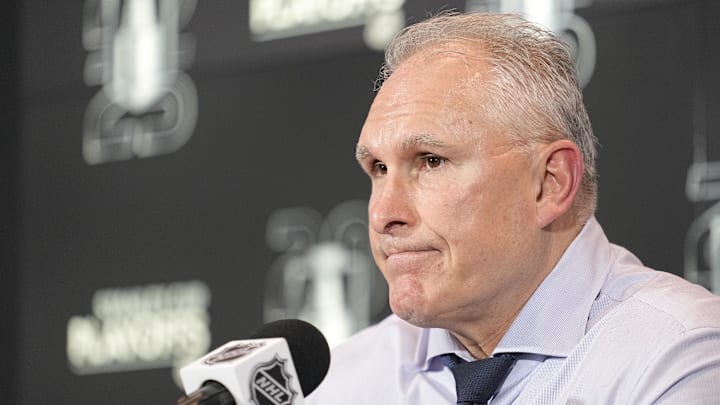Craig Berube's first season behind the bench yielded significant progress, particularly in areas that had long plagued the team. Under this watch, the Maple Leafs tightened up defensively, played with greater structure, and captured the Atlantic Division title, no small feat in a stacked conference.
While Year 1 brought a much-needed shift in identity, Year 2 will demand more. From solidifying team depth to solving lingering playoff shortcomings, Berube now faces the challenge of turning an ever-promising foundation into meaningful success when it matters most.
He looks to accomplish this after the Leafs made their first notable change to their core in a decade. With Mitch Marner headed to the Vegas Golden Knights, re-organizing the team's top two forward lines is high on his second-year "to-do" list.
That piece of business will be one of the most scrutinized early-season developments in Toronto, but it's just one of a few priorities for the Leafs' coach in his follow-up year behind the bench.
What to do with the Leafs' forwards
This is undoubtedly Berube's top priority for the 2025-2026 season. The team's forward lines are in a state of flux after Marner's exit. The good news for the Maple Leafs' coach is that he has two stars in Auston Matthews and William Nylander to build around, plus a still productive John Tavares.
Add in rising star Matthew Knies, and four of the top-six spots are accounted for. Finding a fit for a spot on the top line beside Knies and Matthews is one of Berube's most important tasks this year.
Unquestionably, Berube has gone over numerous possibilities over the summer. The frontrunners are Max Domi, who played with Matthews during his franchise-record sixty-nine goal season in 2023-2024, and newcomer Mattias Maccelli. Neither will fill the void left by Marner, but if either can help the Leafs avoid a major offensive regression, it's a win for the Leafs.
Berube will spend most of the year trying different combinations. Whoever lands a top-line job shouldn't get comfortable, as the Maple Leafs will prioritize finding a big-name player to fill a top-six role next offseason.
Determining the team's top two lines will have a trickle-down effect on Berube's choices for the team's bottom-six forwards, especially the third line. That, too, is another chore for the Leafs' coach.
Berube must find a third line that can be physical, forecheck, and contribute offensively in the playoffs. The Leafs need only look at their Atlantic Division rivals, the defending two-time Stanley Cup champion Florida Panthers and Tampa Bay Lightning, also recent winners of multiple Cups, to recognize the importance of a heavy, physical, productive third line. Both teams had arguably the best third lines in hockey when they won championships.
Berube must reignite Leafs offense
The Maple Leafs' defensive improvement was substantial during Berube's first season behind the bench. They gave up thirty-two fewer goals than the 2023-2024 season and were almost automatic in closing out games with a third-period lead.
The tighter defense came at the expense of less offense. The Leafs scored thirty-five fewer goals last year and were involved in many close games, helpful preparation for the tighter-checking of the playoffs. Their two hundred sixty-eight goals were tied for seventh-most in the NHL. Yet, their 3.26 goals-per-game average was their lowest in five years.
At times, the Maple Leafs collapsed the high-danger area in front of the net and adopted a "rope-a-dope" style that relied heavily on the team's goaltending. Berube must find a middle ground that continues the team's solid defensive structure with a return to their previous offensive firepower, a difficult job now minus last year's top point-getter, Marner.
Penalty kill needs attention
An inconsistent, sometimes stagnant power play has cost the Maple Leafs at times over the past two seasons, but their penalty-killing is the bigger concern with their special teams.
Three of the last five seasons, the Leafs have had a sub-eighty-percent effectiveness on the penalty kill. In 2024-2025, their success rate of 77.9% ranked a mediocre 17th league-wide. It's an area that must improve.
The Panthers had the top-ranked penalty-killing unit during last year's playoffs on their way to another title. The Maple Leafs' shorthanded play was better in the playoffs than the regular season, but recent history suggests it's been an underrated issue during recent years.
As Berube enters his second season at the helm, the blueprint for taking the next step is clear. Establishing consistent forward lines, while reigniting the team's scoring touch remains essential for matching the firepower of top contenders. Just as important, Toronto's penalty-kill must become a strength, rather than a liability if the Leafs are to thrive in tight, playoff-style games. With defensive strides already made, Berube's challenge now lies in fine-tuning the details that separate good teams from great ones.
